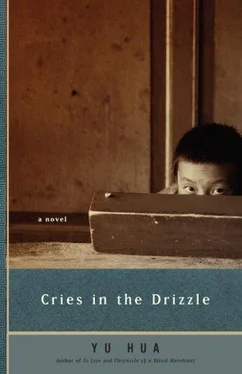When I think back to when I was six years old, one last scene comes to mind. Here again I see myself dashing along at full speed, and in my memory I relive the former glory of the boat-builders’ yard in town, and the day when their first-ever concrete boat was making its way down the river into Southgate. My big brother and I were running toward the riverbank. How bright was the sunlight of those bygone days, illuminating my still-young mother, her blue-checked headscarf fluttering in the autumn breeze; my little brother was seated in her lap, his eyes wide with wonder. My father, with that penetrating laugh of his, clambered barefoot onto the ridge between the fields. But what was that tall man in the army uniform doing there? He seemed to have arrived by chance at my parents’ side, like a leaf blown into a thicket.
The riverside was packed with people. My brother showed me how to squeeze through their legs, and a clamor of voices enveloped us. When we finally crawled into a spot overlooking the river, we stuck our heads out between two grown-ups’ trouser legs and gazed around like a pair of turtles.
The moment of highest drama was announced by an ear-splitting din of gongs and drums and the cheers of the crowd assembled on the banks. The concrete boat was coursing toward us. Long ropes hung down its sides, with pieces of colored paper fastened to them like so many flowers blooming on a vine. A dozen young men on board were banging gongs and beating drums.
“Hey, what's that boat made of?” I called to my brother.
He turned his head and answered with a shout, “Stone.”
“Then why doesn't it sink?”
“You idiot,” he said. “Can't you see the ropes?”
It was at this point in my life that the burly figure of Wang Liqiang appeared in his military uniform, imposing on my memories of Southgate a five-year hiatus. He took me by the hand and led me off toward a steamboat with a piercing whistle. It would carry me down an endless river, to a town called Littlemarsh. I didn't know then that my parents had given me away and I was under the impression that this trip was going to be a pleasurable excursion. On the narrow dirt road I ran into my grandfather, now racked by pains and aches. I answered his troubled gaze with a complacent announcement: “I don't have time to talk to you now.”
Five years later, as I returned alone to Southgate, I was to run into Granddad again on this same road.
Not long after I moved back home, a family from town by the name of Su carne to Southgate to live. One summer morning the two boys of the Su family carried out a small round table and placed it in the shade of a tree. They began to eat breakfast.
This is what I saw then, when I was twelve. The two town boys were sitting there in their store-bought shirts and trousers while I sat alone by the pond in my homespun shorts. I watched as my fourteen-year-old brother led my nine-year-old brother toward our new neighbors. Like me, they were shirtless and dark as two loaches in the sun.
Just before this, I had heard my big brother say, over by the drying ground: “Come on, let's go and see what the townsfolk eat.”
Of the children who had congregated on the drying ground, my little brother was the only one prepared to join him in this inspection of the newcomers. Striding ahead with his chin up, my big brother was boldness personified, while my little brother trotted along at his heels. Baskets of grass cuttings dangled from their arms and swung back and forth as they made their way down the road.
The two town boys laid down their bowls and chopsticks and watched warily as the visitors approached. My brothers did not pause, but marched past the table with a swagger, then looped around the townspeople's house and walked straight back again. Compared with the image struck by my older sibling, my little brother's effort to project authority came across as rather unconvincing.
On their return to the drying ground, my big brother said, “The townsfolk eat pickles, just like us.”
“No meat?”
“No fucking good stuff at all.”
My little brother corrected him. “There's oil in their pickles. We don't have any oil in ours.”
My big brother gave him a shove. “Get out of here. What's so great about oil? We have oil at our house too.”
“But it's sesame oil they've got. We don't have that.”
“You don't know shit.”
“It's true — I could smell it.”
The year when I turned twelve Wang Liqiang died, and I made my own way back to Southgate. Once there, I felt as though I was experiencing the life of an adopted child all over again. In those early days, I often had the strange sensation that Wang Liqiang and Li Xiuying had actually been my natural parents and that this home in Southgate was no more than a kind of almshouse. It was the fire that first stirred those feelings of estrangement, for at the very moment that Granddad and I were walking back to South-gate after our chance encounter, our house was going up in smoke.
This coincidence made my father look at me and Granddad with intense suspicion in the days that followed, for all the world as if we were the ones who had started the blaze. If I happened to stand next to Granddad, he would erupt into howls of frenzied protest, as though he expected our newly erected cottage to burst into flames any second.
Granddad died the year after my return to Southgate. His departure from the scene allowed my father's paranoia about us to dissipate, but this did nothing to alleviate my plight. My big brother took his cue from my father and made no secret of his disapproval of me. Any time I made the mistake of appearing by his side, he would tell me to get lost. So I grew steadily more distant from my siblings, and as the village boys were always doing things with my big brother I became ever more remote from them too.
To compensate, I would immerse myself in nostalgia for my life in Wang Liqiang's home and for my childhood companions in Littlemarsh, recalling countless happy moments, yet assailed at the same time by sadder memories. As I sat alone by the pond, engrossed in reliving the past, my solitary smiles and copious tears left the villagers bemused. In their eyes I was fast becoming a freak. That's why later, when people got into rows with my father, I became a weapon in their arsenal, and they'd say that only defective genes could spawn a son like me.
In all the time I spent in Southgate, there was just one occasion when my big brother turned to me as a suppliant — the time he cut my head open with a sickle, leaving my face dripping with blood.
This was in our sheep pen. When his stinging blow struck my head, I wasn't at all clear what had happened, and what first caught my attention was the abrupt change in my brother's attitude. Only after that did I feel the blood coursing down my face.
He stood aghast in the doorway and begged me to wash the blood off. I shoved him aside and headed out of the village, toward the fields where Father was working.
The villagers were fertilizing the vegetables, and a faint odor of feces wafted on the breeze toward me. As I approached the vegetable plot, I heard several women give cries of alarm and dimly perceived my mother running toward me. When she arrived at my side she asked me a question, but I made no reply, carrying on doggedly toward my father.
In his hand he was holding a long ladle, which he had just lifted out of the honey bucket. He held it stationary in the air as he watched me walking toward him. I heard myself say, “It was big brother who did it.”
He hurled the ladle to the ground, leapt onto the path, and set off for home at a rapid pace.
What I didn't know was that after I left, my big brother had cut my little brothers face with the sickle. Just as my little brother was about to open his mouth and bawl, my big brother explained why he'd done what he did and begged his forgiveness. In my case his entreaties had fallen on deaf ears, but my little brother was more receptive.
Читать дальше












